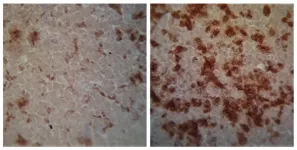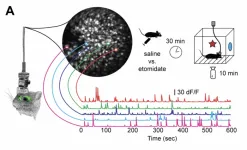(Press-News.org) Despite the success of vaccines for preventing COVID-19, and of drugs for treating the disease, outcomes for severely ill patients admitted to the hospital remains poor. Identifying new therapies for severe COVID-19 remains a high priority and one in which Vanderbilt University Medical Center is taking a leading role.
A study published April 11 in the Journal of the American Medical Association (JAMA) evaluated two drugs that act on the renin-angiotensin system (RAS) as potential treatments for severe COVID-19. Severe acute respiratory syndrome coronavirus2 (SARS-CoV-2), the virus that causes COVID-19, enters pulmonary and myocardial cells through binding of its spike protein to the human angiotensin-converting enzyme 2 (ACE2). ACE2 is a vital enzyme that controls blood pressure and blood flow to multiple organs, including the lungs, heart and kidneys.
A prevailing hypothesis since early in the COVID-19 pandemic is that viral binding to ACE2 inhibits the conversion of angiotensin II (ANG II) to angiotensin 1-7 (ANG 1-7), thereby causing a pathological imbalance in the RAS, favoring the ANG II pathway, promoting inflammation, constriction of the blood vessels and thrombosis (blood clots). Thus, these RAS changes may be central to the development of severe clinical effects in the lungs and other organs.
VUMC led two blinded, placebo-controlled multicenter randomized clinical trials evaluating two investigational drugs aimed at regulating the RAS during SARS-CoV-2 infection. These two agents work in different ways to balance the Ang II to ANG (1-7) ratio. TRV-027 is a biased ligand acting on the angiotensin II receptor, while TXA-127 is synthetic angiotensin (1-7).
The trials demonstrated that neither drug was effective for treating severe COVID-19.
“The finding from these trials demonstrate that giving drugs that are designed to modulate the RAS in a way that would seem to counteract damage done by the virus are not helpful in very sick patients with COVID-19,” said the study’s first author, Wesley Self, MD, MPH, associate professor and vice chair of the Department of Emergency Medicine, Senior Vice President for Clinical Research and Deputy Director, Vanderbilt Institute for Clinical and Translational Research. “These results are disappointing in that we did not identify new drugs for patients suffering from COVID-19. But they are also important because we now understand that giving these drugs, which would seem very logical from a mechanistic perspective, should not be done,” he said.
“We hypothesized increased levels of ANG II may be responsible for some of the changes in the human body due to COVID-19 infection,” said Sean P. Collins, MD, MSci, professor of Emergency Medicine, study chair, and the paper’s senior author. “If there’s too much ANG II, blood vessels in the lungs start to constrict, resulting in not enough blood flow to the lungs. This can lead to small blood clots in the lungs resulting in inflammation. We know that ANG II does that and that COVID-19 patients express some of those abnormalities. So, the logical thinking has been there’s too much ANG II in COVID-19, and we need to counteract these levels. However, the results from these two trials do not support this idea,” he said.
“We understand a lot better now that these simple fixes in this pathway aren’t going to be effective,” said Matthew S. Shotwell, PhD, the study’s primary statistician and associate professor of Biostatistics. “We now are focusing on understanding why we saw the results we observed in these trials.”
Self said that blood collected from the patients participating in the trial will now be analyzed to measure proteins to understand more about the process.
“The ACTIV-4 Host Tissue trial was created to rapidly assess therapies that could potentially alter the body’s response to infection and support recovery,” said Yves Rosenberg, MD, MPH, branch chief of the Atherothrombosis and Coronary Artery Disease branch, located within the Division of Cardiovascular Sciences at the National Heart, Lung, and Blood Institute (NHLBI). “While these two drugs were not effective, we answered a pivotal question and are hopeful another agent being studied in ACTIV-4 Host Tissue may be beneficial.”
The study was part of the U.S. National Institutes of Health Accelerating COVID-19 Therapeutic Interventions and Vaccines (ACTIV-4) program that rapidly evaluates host response therapies for the treatment of COVID-19. It was funded through the NHLBI grant 1OT2HL156812 and received additional support from the intramural research program at NHLBI and NIH.
This content is solely the responsibility of the authors and does not necessarily represent the official views of the NIH.
END
VUMC-led trial shows two investigational drugs are ineffective for treating severe COVID-19
2023-04-11
ELSE PRESS RELEASES FROM THIS DATE:
How road rage really affects your driving – and the self-driving cars of the future
2023-04-11
New research by the University of Warwick has identified characteristics of aggressive driving – which impact both road users and the transition to self-driving cars of the future.
In the first study to systematically identify aggressive driving behaviours, scientists have measured the changes in driving that occur in an aggressive state. Aggressive drivers drive faster and with more mistakes than non-aggressive drivers – putting other road users at risk and posing a challenge to researchers working on self-driving car technology.
The research comes as a leading Detective Chief Superintendent, Andy ...
Personalized blood pressure treatment more effective
2023-04-11
Patients treated with blood pressure-lowering drugs can experience much greater improvements from a change of medication than from doubling the dose of their current medication. This is shown by a new study from Uppsala University, published in the Journal of the American Medical Association (JAMA). In this study, 280 patients tested four different blood pressure-lowering drugs over the course of a year.
“The effect of a change of medication can be twice as great as the effect of doubling the dose of the patient’s current medication. It was clear in our study that certain patients achieved lower blood pressure from one drug than from another. This effect is ...
Nanoplasmonic imaging reveals real-time protein secretion
2023-04-11
Cell secretions like proteins, antibodies, and neurotransmitters play an essential role in immune response, metabolism, and communication between cells. Understanding cell secretions is key for developing disease treatments, but current methods are only able to report the quantity of secretions, without any detail as to when and where they are produced.
Now, researchers in the BIOnanophotonic Systems Laboratory (BIOS) in the School of Engineering and at the University of Geneva have developed a novel optical imaging ...
Mutant strains of Salmonella make infection more aggressive in commercial poultry, study shows
2023-04-11
In Brazil, a group of researchers supported by FAPESP created mutant forms of Salmonella to understand the mechanisms that favor colonization of the intestinal tract of chickens by these pathogenic bacteria and find better ways to combat the infection they cause.
An article on the study is published in the journal Scientific Reports. In it, the researchers note that, contrary to expectations, the mutant strains caused more severe infections than wild-type bacteria.
In the mutant strains, the genes ttrA and pduA were deleted. In previous research using mice, both genes had been shown to account for the ability of Salmonella to ...
Financial toxicity of cancer impacts partners’ quality of life
2023-04-11
ANN ARBOR, Michigan — A cancer diagnosis can cause financial strain on patients as they cope with the cost of treatment and lost work. But what about their partners?
A new study from University of Michigan Rogel Cancer Center researchers surveyed the partners of colorectal cancer patients and found the financial impact of a loved one’s diagnosis also impacts the partner’s health-related quality of life.
“We know that financial toxicity or hardship is a significant effect of cancer and its treatment ...
Danforth Center research uncovers how plants pass ‘memory’ of high CO2 to their offspring
2023-04-11
ST. LOUIS, MO, April 10, 2023 – New research lead by Keith Slotkin, PhD, member, Donald Danforth Plant Science Center opens the door for scientists to equip plants with the tools they need to adapt to rising levels of carbon dioxide (CO2), high heat, and other stressors associated with climate change. The newly published study in the journal The New Phytologist revealed
that the transgenerational inheritance occurred via DNA methylation, the process by which plants “mark” DNA without changing the code of the DNA itself ...
Icahn School of Medicine at Mount Sinai names new chair of microbiology
2023-04-11
Ana Fernandez-Sesma, PhD, has been appointed Chair of the Department of Microbiology at the Icahn School of Medicine at Mount Sinai. Dr. Fernandez-Sesma will direct all educational and research functions of the Department, while cultivating an academic culture that advances insights into virology, vaccinology, immunology, and microbiology, and encourages innovative approaches to teaching and mentoring.
Dr. Fernandez-Sesma has distinguished herself as an investigator focused on the mechanisms of immune evasion used by viruses, including dengue (DENV), ...
Conspiracy theories cause populism to rise
2023-04-11
Coinciding with the increased support for populist parties that we have witnessed all over the West, the last decade has also seen an increase in the number of populism-related studies, covering topics such as the causes and consequences of voting for parties that support these ideas, or the reasons for and possible consequences of the emergence and increasing presence of the attitudes on which they are based.
The links between conspiracy theories and populism have also aroused a great degree of interest. Carolina Galais, a researcher at the Universitat ...
Breast tomosynthesis improves screening in community settings
2023-04-11
OAK BROOK, Ill. – Researchers have found that digital breast tomosynthesis (DBT) has improved breast cancer screening performance in community practice and identifies more invasive cancers, compared to digital mammography. In addition, radiologists’ interpretive performance improved with DBT. The results of the study were published today in Radiology, a journal of the Radiological Society of North America (RSNA).
“Our study demonstrated that more radiologists in U.S. community practice are meeting recommended performance standards with digital breast tomosynthesis than ...
Key memory receptors are located on interneurons
2023-04-11
A key receptor regulating memory formation has been localized to interneurons, according to a study with implications for drug development. Robert Pearce and colleagues probed the localization of γ-aminobutyric acid type A receptors that incorporate α5 subunits (α5-GABAARs). α5-GABAARs are concentrated within the hippocampus, a brain structure that is essential for the formation of episodic memories. The general anesthetic etomidate blocks learning by targeting α5-GABAARs, as do many drugs designed to enhance cognition, intended for use in people with Alzheimer’s disease, ...




